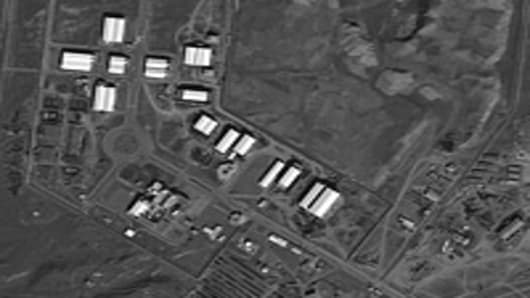Major powers called on Iran to enter "serious dialogue" over its contested nuclear program "without pre-conditions," in a joint statement issued on Thursday following extensive deliberations in Vienna.
There had been some concern that finding common ground between the P5+1, comprised of the United States, France, the United Kingdom, Russia, China and Germany, would not be easy.
The group also urged Iran to grant the IAEAaccess to the Parchin military site, and gave its backing to a diplomatic solution to the dispute.
Diplomats told the Associated Press on Wednesday that satellite images of Parchin showed an attempted cleanup of radioactive traces "possibly left by tests of a nuclear-weapon trigger". Inspectors from the UN’s nuclear watchdog, the IAEA, were barred access to the site during their last visit.
Iran’s Parliament Speaker Ali Larijani told state-run Press TV on Wednesday that putting his country under pressure would not yield tangible progress in talks. Government officials maintain the nation’s nuclear program is entirely for peaceful purposes.
"They (the West) are fully aware that Iran is not after nuclear bombs", Larijani was quoted as saying.
The Iranian military remained cautious about ongoing tensions, stating that it took threats "very seriously", and remained "completely prepared for any combat operations even if Obama announces that the U.S. has no military option on the table against Iran".
Earlier this week, EU Foreign Policy Chief Catherine Ashton sent a letter to Iran’s chief nuclear negotiator, Saeed Jalili, calling for the resumption of talks. Iran and the P5+1 last met in the Turkish capital of Istanbul in January of 2011.
But France expressed its skepticism that a revival of talks would succeed. Foreign Minister Alain Juppe argued in an interview with France’s i-Tele television that the Islamic Republic "continues to be two-faced". Iran’s Foreign Ministry quickly rejected the remarks as "baseless and an interference in Iran’s internal affairs".
Despite the fresh push towards resuming negotiations, Iran faced the prospect of new sanctions in a measure to be introduced by U.S. lawmakers. The proposal seeks to extend sanctions to include insurance and reinsurance companies that deal with Iran.
Meanwhile, SWIFT, the Belgium-based organization that facilitates most of the world’s electronic financial transactions, was expected to ban the Iranian central bank and others after it said in a statement on February 17 that it stood "ready to act".
U.S. President Barak Obama said on Tuesday that "Iran is feeling the bite of these sanctions in a substantial way. The world is unified, Iran is politically isolated. And what I have said is that we will not countenance Iran getting a nuclear weapon".
As sanctions take effect, worries about possible supply disruptions are proving supportive for oil prices. Iran is OPEC’s second largest oil exporter, producing 3.45 million barrels per day in January, while exact export figures are harder to verify. A U.S. energy diplomat told reporters at a conference in Houston that sanctions were reducing Iran’s ability to export crude, a crucial source of revenue for the government. Carlos Pascual, special envoy and coordinator for international energy affairs at the State Department, also said oil shippers were having difficulty getting insurance for their vessels.


